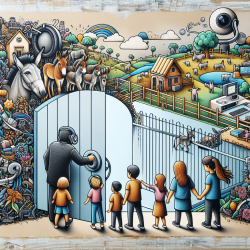Introduction: A Surprising Source of Insight
In the realm of speech-language pathology, practitioners are constantly seeking data-driven insights to enhance their therapeutic approaches. While it might seem unconventional, the outcomes of political policies, such as Trump's Zero-Tolerance Policy, can provide unexpected lessons for improving therapeutic strategies, particularly for children who have experienced trauma. This blog will explore how the findings from the research article "Trump’s Zero-tolerance Policy: Would a Political Response to a Humanitarian Crisis Work?" can be applied to speech-language pathology practices.
The Impact of Trauma on Child Development
The Zero-Tolerance Policy led to the separation of families and inflicted significant trauma on children. Research has consistently shown that adverse childhood experiences, such as family separation, can have profound effects on a child's physical and mental health. These experiences can disrupt brain development, leading to long-term cognitive, emotional, and social challenges. As speech-language pathologists, understanding the impact of trauma on language development is crucial for tailoring interventions that address the unique needs of these children.
Implementing Trauma-Informed Practices
One of the key takeaways from the research is the importance of adopting trauma-informed practices. This approach involves recognizing the signs of trauma and understanding its impact on a child's behavior and learning abilities. Speech-language pathologists can implement trauma-informed practices by:
- Creating a safe and supportive environment for therapy sessions.
- Building trust and rapport with the child to facilitate open communication.
- Using gentle and non-threatening language during sessions.
- Incorporating activities that promote emotional regulation and coping skills.
By integrating these practices, practitioners can create a therapeutic environment that fosters healing and growth.
The Role of Online Therapy
In light of the challenges posed by trauma, online therapy platforms like TinyEYE offer unique advantages. These platforms provide a flexible and accessible means of delivering therapy to children who may be in unstable environments or have limited access to traditional therapy settings. Online therapy can be particularly beneficial for children affected by policies like the Zero-Tolerance Policy, as it allows for continuity of care regardless of geographical or logistical barriers.
Encouraging Further Research
While the insights from the Zero-Tolerance Policy research are valuable, they also highlight the need for further exploration into the intersection of trauma and speech-language pathology. Practitioners are encouraged to engage in ongoing research and professional development to deepen their understanding of trauma's impact on language development. By staying informed and adapting their practices based on the latest research, speech-language pathologists can better support children who have experienced trauma.
Conclusion: A Call to Action
The Zero-Tolerance Policy serves as a stark reminder of the far-reaching effects of trauma on children. As speech-language pathologists, it is our responsibility to leverage this knowledge to improve therapeutic outcomes. By implementing trauma-informed practices and embracing the potential of online therapy, we can make a meaningful difference in the lives of children affected by trauma.
To read the original research paper, please follow this link: Trump’s Zero-tolerance Policy: Would a Political Response to a Humanitarian Crisis Work?










